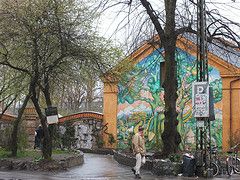Paco has decided to visit Sierra Leone and Kenya: I've just arrived in Sierra Leone
Paco has just arrived in Freetown, Sierra Leona. As you know, he wanted to visit several other places in Africa before going to the mines of diamonds in this country. However, as almost always, he saw a documentary on TV which made him decide to come to Freetown first. Before visiting the mines, he has also decided to write a letter to Andrés and the rest of his friends. So, he has written the letter, and at this very moment he is reading it...
Dear friends,

By inkognitoh. C. Commons
My first thought was to write to everyone. But my plans have just turned upside down the past few days. I've just arrived in Freetown, Sierra Leone. A documentary about this country in the west of Africa made me change my mind and come to visit the diamond mines here. I'm willing to learn about and visit the mines here, so I'm afraid I won't have enough time to write a letter or postcard to everyone. That's why I'm writing this letter to you all. By the way, Andrés, thank you very much for your phone call last week. You've always been very kind and supportive. Well, all of you have always been very kind and supportive!
As you know, I've left South Africa, but not under the circumstance I would have wished. In fact, I'm rather sad and disappointed that I witnessed such a cruel scene in the Apartheid museum. I think white people have never treated black people as they deserve in that country. I really hope things change in the future. In any case, things have changed quite a lot there since the apartheid was ended in 1994. However, after staying there, I believe that some vestiges of the apartheid have remained in the country.
Well, anyway, now I'm here, in Freetown; and, although I have come to another country which hasn't got over the long civil wars it has suffered for the last 15 years, I really hope to have a good time and learn lots of things about this country and its people. I'll let you know about it as soon as I can.
Take care and let me know about you all!
Paco.
Fill in the chart with the sentences in the Present Perfect tense Paco uses in the letter to his friends.
| Affirmative statements | Negative statements |
 |
| By Gwen's River City Images. C. Commons |
Verdadero Falso
Verdadero Falso
Ask Mike any word, phrase or sentence you doubt how to pronounce, he will help you! Come back whenever you need him!

|
| Click here to ask Mike |